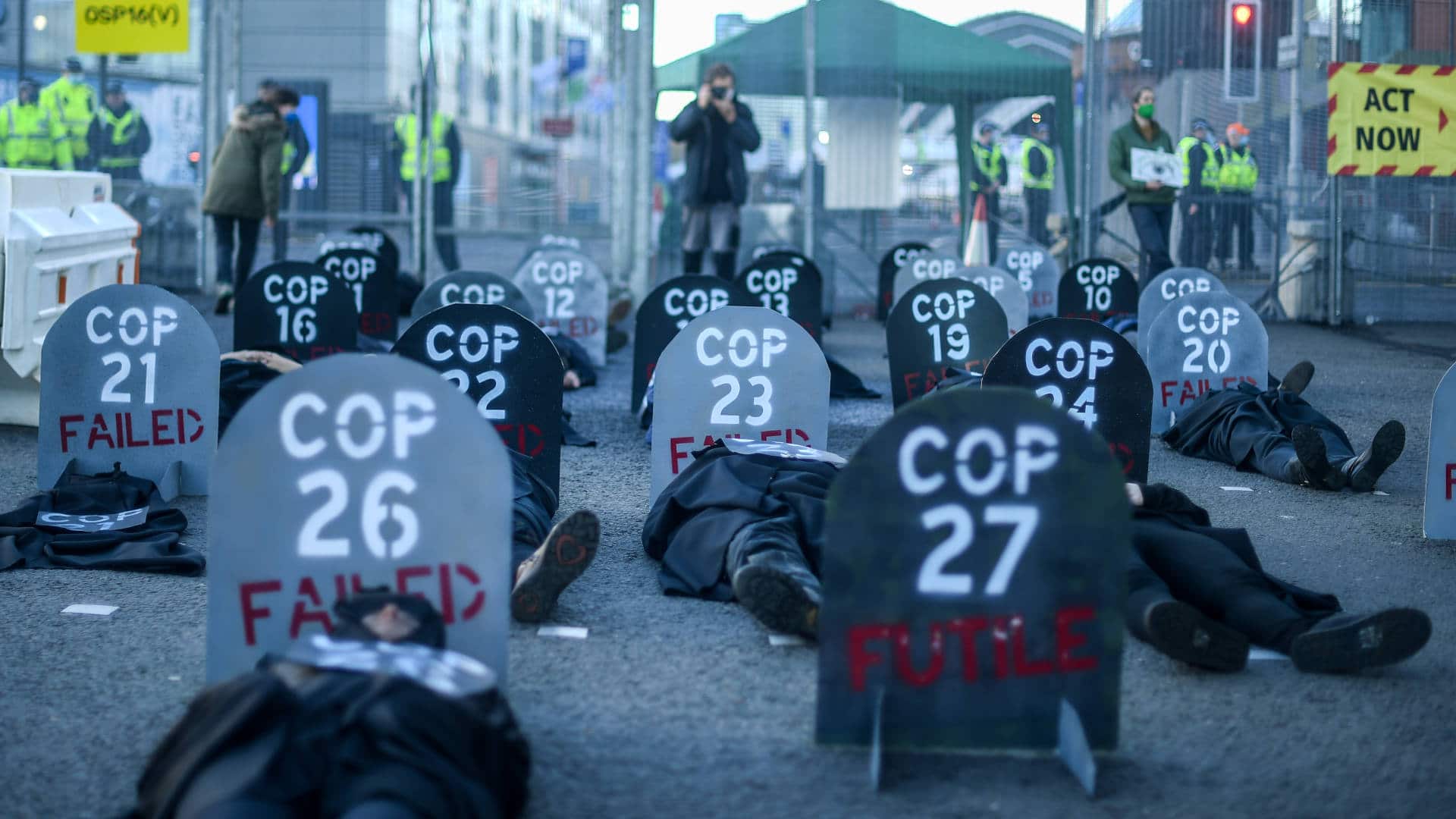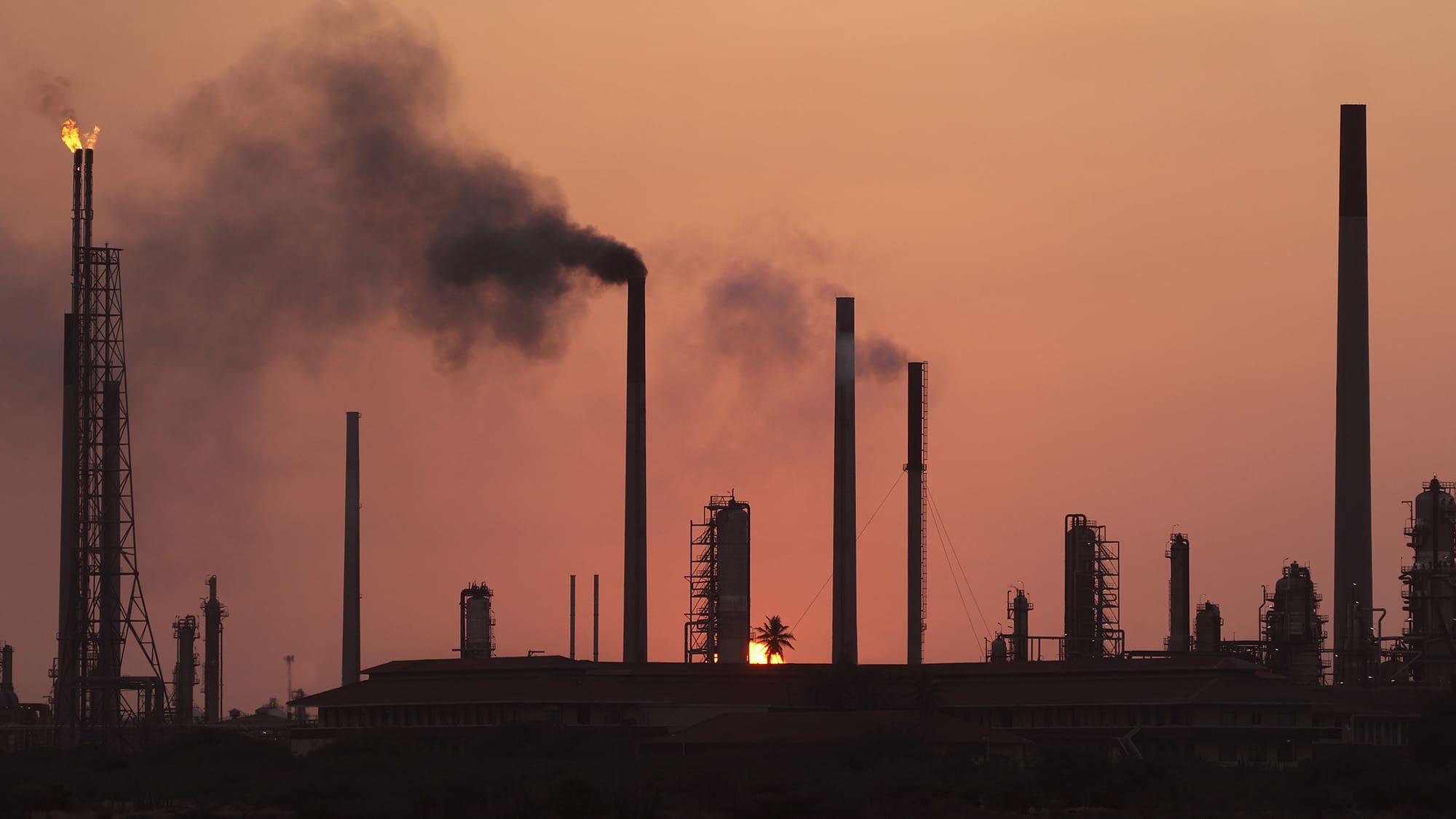The news reports from the United Nations Climate Change Conference in Glasgow this month followed a predictable pattern. World leaders took to the stage one after the other, each of them issuing dire warnings about imminent climate disaster and concluding with urgent calls to action: It’s not too late…but we must act now!
This message feels tired, its urgency attenuated from decades of repetition. “Now” was once the 1970s, with the birth of the modern environmental movement; “now” was the Kyoto Protocol and its carbon-reduction commitments of the 1990s; “now” was Paris 2015. Now, some believe, is now too late: The tipping point has come. We’re at the apex of the curve, on the verge of an unstoppable cascade that will irreversibly alter the systems governing the natural world. It’s too late. And if we, as a society, copped to that fact, we’d all benefit immensely.
This is the argument of Deep Adaptation, a movement launched in 2018 by Jem Bendell, a professor of sustainability leadership at the University of Cumbria in the United Kingdom. The movement situates the conversation about society’s future in a new realm, one in which catastrophic climate change is taken as a given. Bendell says the world will become an unfamiliar place: Everything we’ve known about the dynamics driving our lives will be overturned by climate-induced disruption, leading to societal collapse. Only when we accept this inevitability can we prepare for the coming catastrophe “in ways that may reduce harm, especially by reducing conflict and trauma,” writes Bendell.
Deep Adaptation has attracted a worldwide following: The founding document was downloaded more than a half million times, according to Bendell, and forums have solidified a base of participants, from students to psychologists to scholars. Recently, more than 500 scholars signed an open letter espousing the main tenets of Deep Adaptation, and urging policymakers to “engage openly with the risk of disruption and even collapse of our societies.”
As an author who delved into climate-change science for my book “Deep Salt Water,” I’m compelled by the sober and dispassionate honesty of Deep Adaptation. I find Bendell’s scientific conclusions convincing, even though many experts disagree with them. I’m also heartened by his framework: Solutions can’t be found unless the problem is posed correctly. Where I diverge from Deep Adaptation is in its emphasis on societal collapse. Where Bendell sees a sort of fait accompli, I see accumulating evidence that, despite the imminent climate crisis, technology will bolster the pillars that uphold society.
I discovered Deep Adaptation after reading a preprint study about climate anxiety among youth. The study — submitted to Lancet Planetary Health but yet to undergo peer review — surveyed 10,000 people aged 16 to 25, from 10 countries. It revealed a population riddled by fear and angered by the betrayal they ascribe to people in power. The authors of the study are part of a burgeoning community of psychologists who specialize in dealing with climate anxiety.
These psychologists urge their colleagues to recognize climate-related grief and fear as a rational response to actual events, not as a manifestation of an underlying psychopathology such as anxiety or depression. Despite offering a necessary forum to youth in distress, this therapy continues to promote the idea that climate catastrophe can be avoided, or at least reduced. As Caroline Hickman, a co-author of the youth climate anxiety study and a lecturer at the University of Bath, tweeted last month: “Between apocalyptic thinking and naive misplaced optimism is radical hope. Things are bad, AND we can change the end of this story.”
To me, that message is disingenuous, if not unintentionally cruel. How can youth be supported if their anxieties are initially validated, only to be amplified as climate commitments are broken by leaders, and disasters keep coming?
The Deep Adaptation movement creates a better framework, arguing that people build psychological resilience by contemplating four guiding questions:
What do we most value that we want to keep and how? That’s a question of resilience. What could we let go of so as not to make matters worse? That’s a question of relinquishment. What could we bring back to help us with these difficult times? That’s a question of restoration. With what and whom shall we make peace as we awaken to our common mortality? That’s a question of reconciliation.
Through this framework, Bendell succeeds in distilling a terrifying future into a series of questions that invite people into conversation. By doing so, he gives us a language to speak the unthinkable.
Bendell’s 2018 manifesto, which laid the foundation for the movement, has been sharply criticized on scientific and moral grounds. The most comprehensive critique argues that Bendell misinterprets the predictions of climate models, ignores important caveats, and adopts a “doomist” narrative that, the critics say, will lead to despair and inaction, exacerbating existing inequalities and sapping energy from the fight for climate justice. Bendell accepted some of these criticisms, making a few corrections and updates to his original manuscript. But he countered others, holding steadfast to the broader principles motivating Deep Adaptation. (The New York Times reported that Bendell’s original manuscript was “submitted to and rejected by a peer-reviewed sustainability journal.”)
In my assessment, the political context tips the scale in favor of Bendell’s view: Even if, on a purely scientific level, we could stop the feedback loops already set in motion, our political, economic, and governance structures have proven incapable of proactively responding with measures commensurate to the threat.
Despite its significant contribution to the thinking about climate change, Deep Adaptation contains a weakness at its core: the premise that climate change will lead to society’s collapse, defined as “the uneven ending of normal modes of sustenance, shelter, security, pleasure, identity, and meaning,” Bendell writes.
Bendell’s logical leap from catastrophic climate change to societal collapse betrays his stance against capitalism, which he has blamed for the climate crisis. Bendell denigrates mainstream adaptation efforts as “encouraging people to try harder to be nicer and better rather than coming together in solidarity to either undermine or overthrow a system that demands we participate in environmental degradation.” By implication, those efforts — the unglamorous work of revamping infrastructure, engaging in urban and ecosystem planning, coordinating supply chains for food, water, and raw materials — are superficial, unlike the profound ethical and spiritual transformation that Deep Adaptation envisions. Societal collapse, in this worldview, becomes the event that triggers a creative reimaging of human civilization.
Blinded by utopian visions, Bendell seems to overlook the advancements, in science and technology and other realms, that are capable of upholding society. In sectors such as energy, water, materials science, and agriculture, basic science and innovative technology are spawning new realities that could stabilize societies, even amid horrific shifts in the natural world. Some of this technology, including large-scale nuclear fusion reactors and smaller nuclear batteries, will reduce carbon emissions. Other technologies, especially those developed with synthetic biology, may help us adapt to a warming planet by, for example, improving crop yields and revolutionizing manufacturing. By seizing a power once reserved for nature — the power to direct evolution — scientists can tackle some of the very problems humans have created through their consumption of fossil fuels.
None of these developments is a panacea. None will stop catastrophic climate change. None prefigure a world I want to live in. Yet they all refute the idea of societal collapse.
Bendell’s failure to recognize the promise of technology is a tremendous loss for policymakers, activists, psychotherapists, and industry. We currently lack a framework for discussing the work needed to prepare for climate change. That work pertains not only to physical infrastructure but to psychology and ethics — especially as it regards the predicted mass migration of people whose homelands will no longer be habitable.
In my view, Deep Adaptation is perfectly poised to facilitate this difficult conversation — if it eases its focus on societal collapse. Bendell’s framework encourages us to “make sense of our situation in ways that discourage defensive or violent approaches and encourage more kind, wise, and accountable responses.”
This type of thinking is lucid, productive, and necessary. I’ll hold it more fiercely than any vapid statement coming from Glasgow.
Marianne Apostolides is an award-winning author of seven books, most recently the novel “I Can’t Get You Out of My Mind.”












Comments are automatically closed one year after article publication. Archived comments are below.
In fact, none of the factors listed that “refute societal collapse” as a probability avtually refute societal collapse in even the slightest manner. My goodness! Those aspirationally helpful possibilites may become realities someday. And then they would begin a slow and difficult process of scaling up enough to make a significant difference. The author is a very skilled and talented writer, but on this subject has fallen into a spiral of blind-faith hopium, or something along those lines.
Climate apocalypse is just part of a few hundred years of malthusian theory being completely wrong.
People have a ridiculously poor ability to predict things of such complexity more than 20-30 years ahead.
To make predictions, they have to fix their models as never changing from their present day.
It leaves no way for humans to adapt.
While I am always suspicious of your theory (and many other’s) that humans will science their way out of every problem, it is certainly one thing that will help.
All the people who said the world’s population was gonna become like 25 billion, are wrong. Those who said agriculture would fail by now, were wrong. Yet new people keep saying the same things and expecting us to believe them this time, like some apoctalyptic cult leader.
The world’s people will slowly encounter worse and worse issues and respond to it by changing their behavior.
Many will suffer, many will die.
But we’ll adapt and survive and then thrive again.
If we have to capture carbon, we’ll do that. If it’s fusion energy, we’ll do that. If we have to geo-engineer the atmosphere to be colder, we’ll do that.
We don’t put much effort into any of it now, because we aren’t being hurt enough by climate changes yet or desperate enough yet.
But the models expecting no one to change their behavior as things get worse are ridiculously blind.
Marianne gets a lot of things right, but she is overly sanguine about the fragility of society and the promise of technology.
Generally agree with authors arguments. Some for of civilization will continue. Would add that our current science makes it clear there’s one race Human. Before adjectives are added we are Human. DNA defines all of life. Second science revelation so far, there’s only one known home for DNA based life, Earth. Assuming we don’t accidentally or intentionally blow ourselves to bits with the 14,000 or so nuclear weapons still in place humanity will fall inline with Earth’s daily ability to refresh itself with our only fuel, sun light.
Marianne, you live in some kind of alternate fantasy universe where the laws of physics of our universe don’t apply.
The reality is that we–over here in our universe–are fucked.
Given that our atmosphere’s current greenhouse gas profile was last seen approximately 520 mya; near the end of the Permian epoch? Humanity can expect the same atmospheric results as occurred back then. A massive extinction event that killed off over 95% of all life form’s; on land or in the sea’s. The earths oceans became acidic solutions gassing off hydrogen sulfoxide’s, and atmospheric oxygen percentages dropped down to as low as 11 percent.
This was recorded in rock that was being created at the time, and Physics don’t lie. Humanity would need to be removing a billion tons of carbon dioxide per day from the atmosphere, everyday for the next 28 to 30 years, to bring atmospheric CO2 levels back down to around 320 ppm.
Look it up. The geophysics data, the atmospheric chemistry? All recently published reports in the usual accredited and peer reviewed science journal’s. Do the math for yourself, and come to a better understanding of reality, as it is in fact. Humanity has created, in the little more than 200 years of industrial civilization, an atmosphere and rapidly changing climate, that we are not evolved to adapt to ‘nor survive in.
Humanity is well entrained in a mass extinction event that “we” created for ourselves. And there is no human technology capable of changing that fact.
For me? Life has come to be all about acceptance, and surrendering to the facts. Trying to be kinder to “Life”, and my fellow human beings. Stay in the moment.
Is that right Harry? I thought 50 million years ago when dinosaurs thrived the global temperature was 12 degrees above now and CO2 was over a thousand parts per million. And life went on.
Life went on, Colin
but ‘dinosaur society’ collapsed.
The author seems to be concerned about Jed Bendell’s criticism of capitalism.
I am critical of economics based on assumptions of continued growth,
and its worsening affect on our ecological footprints, as nations, as individuals.
Imho, the vast majority of us who are able to post on the web are wearing clown shoes, so to speak. That said, our consumption is as nothing to the consumption of energy, production of greenhouse gases and widespread carelessness of militaries worldwide.
Here’s an interesting link about US military response to global warming:
https://thebaffler.com/latest/greenwashing-the-military-industrial-complex-craven